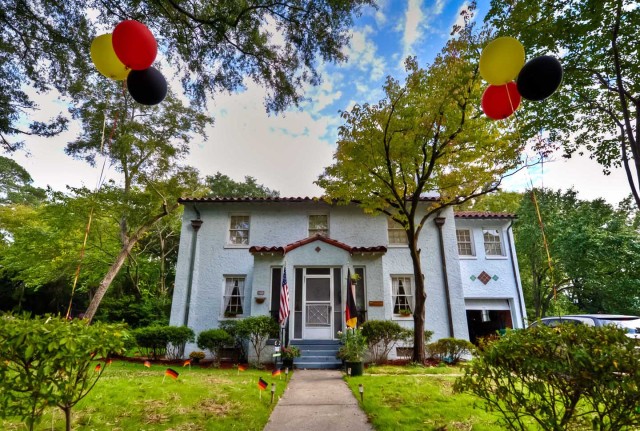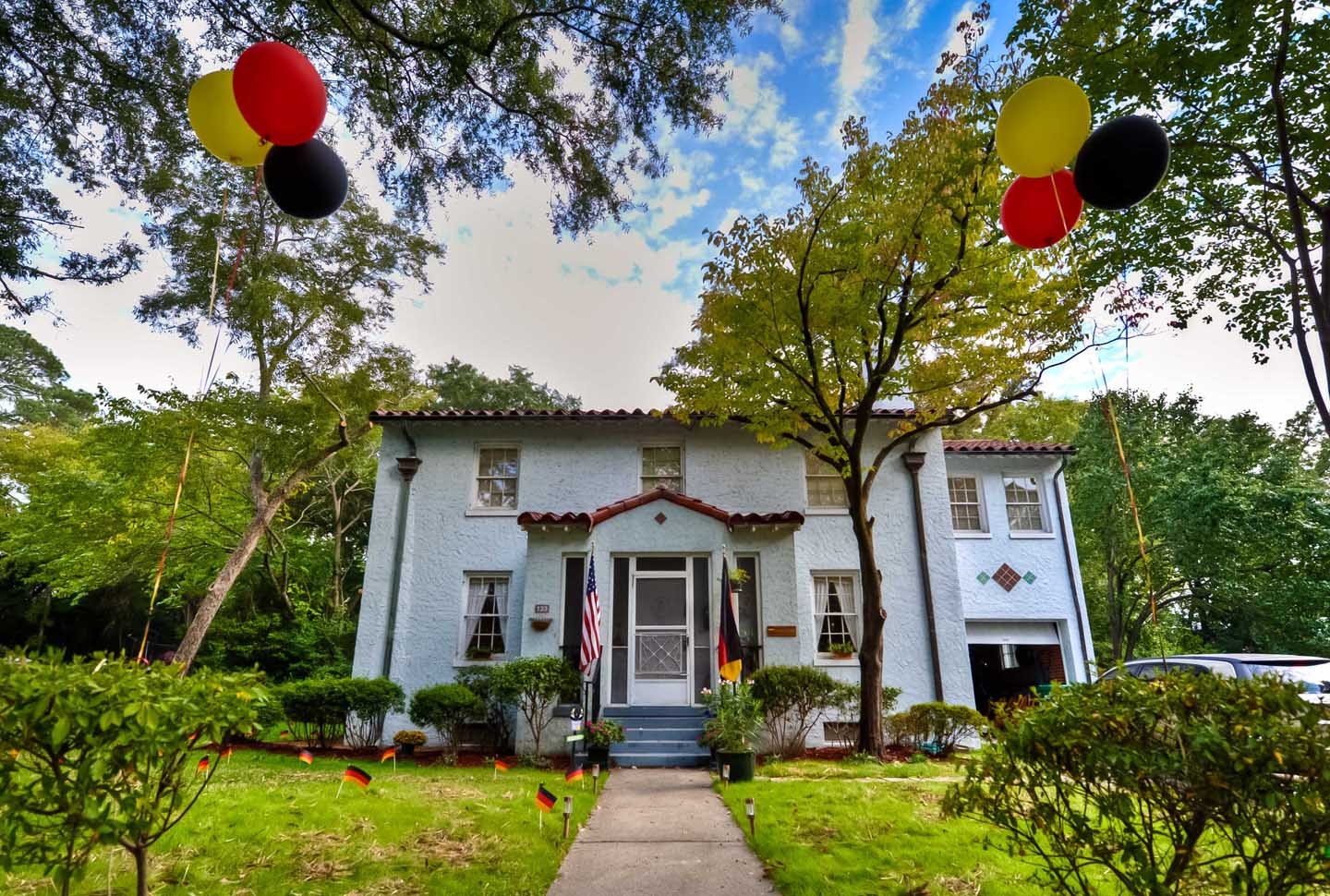FORT BENNING, Ga. - Post leaders came together Tuesday evening to celebrate German Unity Day, marking the 20th anniversary of the nation's reunification.
Known by Germans as "Tag der Deutschen Einheit," the event commemorates the treaty between West and East Germany that went into effect Oct. 3, 1990, the day both countries officially became one again after the Berlin Wall was torn down a year earlier. It's a national holiday in Germany.
Fort Benning's observance took place at the on-post residence of Lt. Col. Frank Schuster, the German Infantry liaison officer, and his wife, Regina. The reception included traditional German food, beer and champagne.
"It is not important when we celebrate German Unity Day ... because it's just very important to celebrate it," Lt. Col. Schuster said. "Twenty years later, we are all very proud to be German - it doesn't matter to be on the East or West part. A lot of things have been changed ... but we're all happy to be one.
"It's the same as in the Army - doesn't matter if it's the German or U.S. Army - we are one unit and one team. And the same is with Germany."
He told the gathering how his father, a former journalist, had been on the eastern side of Berlin picking up photographs the day the Wall was built in 1961, but managed to make it back to the western part "at the right moment." Two years later, Lt. Col. Schuster was born.
Sgt. Maj. Frank Zindel, the NCO representative at the German Armor liaison office, said he grew up in the middle part of West Germany, about 15 miles from a fence bordering the East. People could gaze over and see East Germany, but no one could visit without a special visa.
It was a "dangerous time" as tensions were always high between the two sides, he said, recalling how armed guards, surveillance systems and minefields sat just across the East border. Over there, mistrust and suspicion became a part of life. The sergeant major said people would occasionally discover that a good friend or relative was actually working for "the Stasi," the name given to East Germany's security machine.
"I only knew there was a fence - they are East part, we are West part," he said. "(Reunification) came so suddenly. ...I never thought I'd see it. It surprised everybody how fast it happened."
Economic conditions in the former East Germany were severely depressed, Sgt. Maj. Zindel said. People didn't have the same democracy or freedoms enjoyed in the West and the living standard was far lower. He said much has changed.
"You can really see the development now," he said. "Twenty years ago, it was like gray and color (between East and West Germany)."
At Tuesday's celebration, a small contingent from the Maneuver Center of Excellence Band played the U.S. and German national anthems. Lt. Col. Schuster praised the strong ties between the two allies.
"The U.S. helped Germany become the nation it is today," he said.
SGM Bernd Rabenstein of the German Infantry liaison office said he believes German Unity Day is the most significant milestone in the country's history.
"For my father, this day was more important than the end of (World War II)," he said. "A lot of us and our parents lived through that separation. Reunification was talked about a lot, but no one ever thought it would happen."
THE ROOTS OF GERMAN UNITY DAY
"Tag der Deutschen Einheit," which means "The Day of German Unity," is the national day of Germany, celebrated Oct. 3 each year as a public holiday. It commemorates the anniversary of German reunification in 1990.
Reunification was the method in which East Germany's German Democratic Republic and Berlin, reunited into a single city, joined West Germany's Federal Republic of Germany, as provided by its then-Grundgesetz constitution Article 23. Germans commonly refer to the start of this process as "die Wende," or "The Turning Point." The end of unification is officially called German unity.
The East German regime began to falter in May 1989, when removal of Hungary's border fence opened a hole in the Iron Curtain. It caused an exodus of thousands of East Germans fleeing to West Germany and Austria via Hungary. The Peaceful Revolution, a series of protests by East Germans, led to the GDR's first free elections on March 18, 1990, and to negotiations between the GDR and FRG that culminated in a Unification Treaty.
Meanwhile, negotiations between the GDR and FRG and the four occupying powers produced the so-called "Two Plus Four Treaty" (Treaty on the Final Settlement with Respect to Germany), granting full sovereignty to a unified German state, whose two halves had previously been bound by a number of limitations stemming from their post-World War II status as occupied regions. The united Germany remained a member of the European Community - later the European Union - and NATO.
On May 18, 1990, the two German states signed a pact agreeing on a monetary, economic and social union. It took effect July 1, 1990, with the Deutsche mark replacing the East German mark as the official currency of East Germany.
While the GDR transferred its financial policy sovereignty to West Germany, the West started granting subsidies for the GDR budget and social security system. At the same time, many West German laws were adopted in the GDR. This created a suitable framework for a political alliance by diminishing the huge gap between the two existing political, social and economic systems.
A reunification treaty between West Germany and the GDR was negotiated in mid-1990, signed Aug. 31 that year and finally approved by large majorities in the legislative chambers of both countries on Sept. 20. After that last step, Germany was officially united when the clock struck midnight on Oct. 3.


Social Sharing